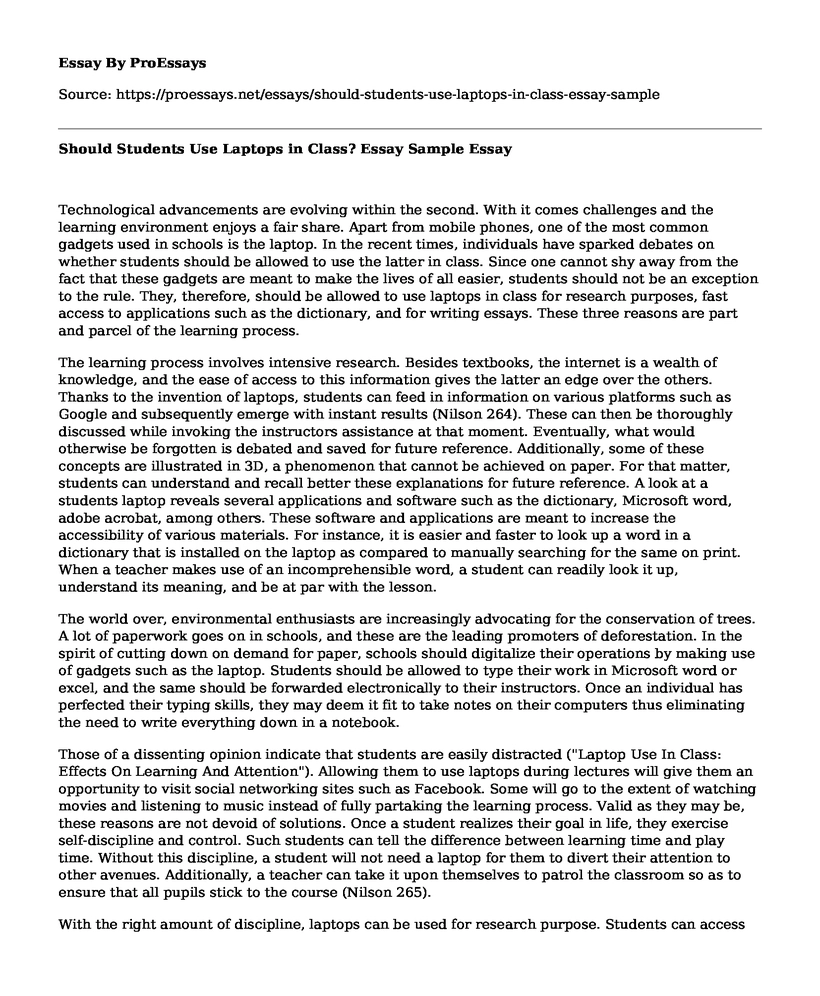Technological advancements are evolving within the second. With it comes challenges and the learning environment enjoys a fair share. Apart from mobile phones, one of the most common gadgets used in schools is the laptop. In the recent times, individuals have sparked debates on whether students should be allowed to use the latter in class. Since one cannot shy away from the fact that these gadgets are meant to make the lives of all easier, students should not be an exception to the rule. They, therefore, should be allowed to use laptops in class for research purposes, fast access to applications such as the dictionary, and for writing essays. These three reasons are part and parcel of the learning process.
The learning process involves intensive research. Besides textbooks, the internet is a wealth of knowledge, and the ease of access to this information gives the latter an edge over the others. Thanks to the invention of laptops, students can feed in information on various platforms such as Google and subsequently emerge with instant results (Nilson 264). These can then be thoroughly discussed while invoking the instructors assistance at that moment. Eventually, what would otherwise be forgotten is debated and saved for future reference. Additionally, some of these concepts are illustrated in 3D, a phenomenon that cannot be achieved on paper. For that matter, students can understand and recall better these explanations for future reference. A look at a students laptop reveals several applications and software such as the dictionary, Microsoft word, adobe acrobat, among others. These software and applications are meant to increase the accessibility of various materials. For instance, it is easier and faster to look up a word in a dictionary that is installed on the laptop as compared to manually searching for the same on print. When a teacher makes use of an incomprehensible word, a student can readily look it up, understand its meaning, and be at par with the lesson.
The world over, environmental enthusiasts are increasingly advocating for the conservation of trees. A lot of paperwork goes on in schools, and these are the leading promoters of deforestation. In the spirit of cutting down on demand for paper, schools should digitalize their operations by making use of gadgets such as the laptop. Students should be allowed to type their work in Microsoft word or excel, and the same should be forwarded electronically to their instructors. Once an individual has perfected their typing skills, they may deem it fit to take notes on their computers thus eliminating the need to write everything down in a notebook.
Those of a dissenting opinion indicate that students are easily distracted ("Laptop Use In Class: Effects On Learning And Attention"). Allowing them to use laptops during lectures will give them an opportunity to visit social networking sites such as Facebook. Some will go to the extent of watching movies and listening to music instead of fully partaking the learning process. Valid as they may be, these reasons are not devoid of solutions. Once a student realizes their goal in life, they exercise self-discipline and control. Such students can tell the difference between learning time and play time. Without this discipline, a student will not need a laptop for them to divert their attention to other avenues. Additionally, a teacher can take it upon themselves to patrol the classroom so as to ensure that all pupils stick to the course (Nilson 265).
With the right amount of discipline, laptops can be used for research purpose. Students can access information at the click of a button thus completing assignments promptly. Also, applications found on computers, such as the dictionary, are essential tools in the learning process. Environmental consideration dictates that individuals should refrain from felling trees for purposes such as the manufacturing of paper. The use of laptops to complete assignments is in tandem with the conservation spirit. Students should, therefore, be at liberty to use these gadgets in the classroom.
Works Cited
"Laptop Use In Class: Effects On Learning And Attention". The Teaching Center, 2017, https://teachingcenter.wustl.edu/2015/08/laptop-use-effects-learning-attention/.
Nilson, Linda B. Teaching at Its Best: A Research-Based Resource for College Instructors. San Francisco: Jossey-Bass, a Wiley imrpint, 2016. Print.
Cite this page
Should Students Use Laptops in Class? Essay Sample. (2021, Apr 26). Retrieved from https://proessays.net/essays/should-students-use-laptops-in-class-essay-sample
If you are the original author of this essay and no longer wish to have it published on the ProEssays website, please click below to request its removal:
- Essay Sample on Teaching Philosophy and Research Interest
- Research Paper on Physical and Cognitive Development in Early Childhood
- Essay on Teaching & Learning: Two Intertwined Processes for Effective Communication
- Essay Example on Child Abuse & Maltreatment: A Global Problem
- Book Review Sample on Foundation of Education: A Comprehensive Overview
- Free Paper on Lifelong Learning: Shaping a Successful Post-College Career and Life
- Ways of Teaching Foreign Language - Essay Sample







